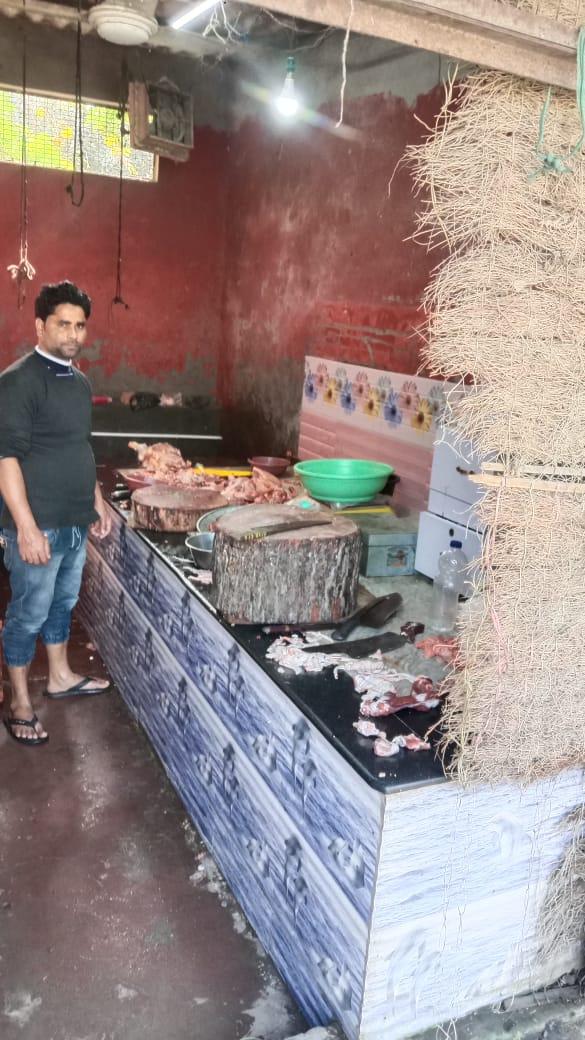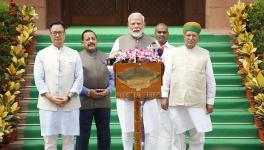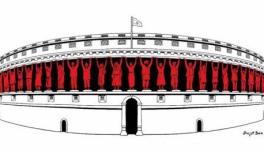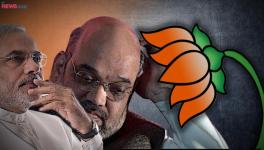UP: Survival at Stake, Meat, Liquor Ban Hits Livelihoods of Thousands in Ayodhya

The sudden move of the UP authorities to crack down on meat shops in Ayodhya has not only put an end to their means of livelihood but has also left them staring at a bleak future. (Photo: Special Arrangement)
Lucknow: Saddam, a chicken shop owner at Mewatipura market, has been supporting his seven family members for the past 10 years by selling chicken, but his shop has been rendered indefinitely non-functional after the Yogi Adityanath-led Uttar Pradesh government recently banned the sale of meat in 84 Kos Parikrama Marg of the Ram Mandir in Ayodhya. The decision has affected a large number of livelihoods in the old city, also known as Faizabad.
Saddam says has been thinking of exploring alternative livelihood options or going back to another city for livelihood, but dilemma clouds in his mind -- what job will he get as unskilled worker?
"For 10 years, we have been running a chicken shop in Mewatipura. The sudden ban on meat selling has left us in the lurch. It is extremely worrying because this was the only source income for me to pay for the education of my children and take care of the household," Saddam, a lone breadwinner, told NewsClick.
The only alternative meat sellers have been given by the Food Security and Drug Administration department as of now is to sell packaged frozen meat that will directly come from Punjab.
Doubting the government's intention, Dastagir Ahmad, secretary of Tanzimul Quraish, a union of meat sellers in the city, told NewsClick that, "At least 90% of those involved in this trade are Muslims and 90% of those who consume meat, especially mutton, are from Hindu community. Therefore, it is a loss for both the communities. But we are at the receiving end."
Mohd Irfan, a member of the Tansimul Quraish said he supplies kilos of chicken and mutton to the CRPF camp and Army headquarters and makes a good amount, but was disappointed after the government’s decision to ban meat in Ayodhya.
"We supply at least 40 kg of chicken to the CRPF's mess every day and the Army office. Whenever there is a party in the Army base office, we also supply raw goats, but now everything will stop," he rued.
Meat shop owners in the area said norms, such as automatic door closers, walls with tiles, black mirror to hide meat, refrigerated vans for transportation of meat, geyser installation and medical fitness certificate of vendors are tough to implement and entail a huge expense.
"It will cost around Rs 2 lakh to maintain the shop according to Food Security officials. Why would anyone spend such a huge amount in a rented shop? Besides, Rs 50 thousand will have to be paid separately for the license to run a frozen meat shop," says Saddam who earns an average of Rs 1,000 a day.
"Sales are good only for four days a week, as most customers are Hindu and they don't eat meat on Tuesday, Thursday and Saturday. We would prefer to close our shop but will not sell frozen meat to our customers because we neither have enough money to maintain the shop nor will we sell jhatka meat," he said.
The sudden move of the authorities to crack down on meat shops has not only put an end to their means of livelihood but has also left them staring at a bleak future.
The question meat sellers are asking is: If chopping chicken and mutton is not allowed, then what is the alternative for them?
Irfan said the decision had hit the livelihood of over 500 families. Last month, he filed a writ petition in Lucknow High Court, seeking stay on ban of meat selling in the city.
"We respect the sentiments of other faiths and are ready to cooperate with the administration, but banning meat 15 km from the radius of the temple does not make sense to us. Ban within five 6-7 km of the temple premises, but such as complete ban in the whole city will destroy hundreds of families who are solely dependent on this trade since several generations," said Irfan, who runs a kiosk of chicken, mutton and fish in Gaddopur of Civil Lines.
Ahmad of Tanzimul Quraish, said the survival of not only meat sellers were at stake but also people directly or indirectly connected with the business.
“Any animal (chicken, mutton and fish) is brought by a trader and the shopkeeper then buys it from him. This is how both of their families are run and the labour that works at meat shops is also dependent on the business. Besides, the businessman who sells skin of animals also earns his living from it. Therefore, the threat to the livelihood is not just for one family because many families are involved in this business, from cutting meat to selling animal skin.
Talking about the frozen meat system, Ahmad said, "The meat is cut at one place in the factory and obviously the company will sell it at its own rate. In the frozen meat selling system, only one person will buy the skin and only one person will sell it, replacing hundreds of families that are involved in the trade now.”
SURVIVAL AT STAKE
On Thursday, the Uttar Pradesh government declared there would be a complete ban on the sale of liquor and meat within the radius of Panch Kosi Parikrama area in Ayodhya and adjoining areas. The announcement was made after a meeting with Shri Ram Janmabhoomi Teerth Kshetra trust general secretary Champat Rai and UP Excise and Prohibition Minister Nitin Agarwal, during which discussions were held on ensuring prohibition on the sale of alcohol and meat in the vicinity of the upcoming Ram Temple.
Agarwal said that the ban was ordered by the Chief Minister and that it applies to the 84 Kosi Parikrama Marg, a sacred route that encircles Ayodhya. He said the officers concerned were directed to make plans for the ban, as well as for the engagement of people involved in such activities in some other trade.
There are about 500 establishments in the area where liquor is sold and served.
Nearly 15,000 workers employed as waiters, cooks and cleaners with these bars, restaurants and liquor shops will be rendered jobless once this decision comes into effect from next week.
Notably, Chief Minister Yogi Adityanath indicated the ban on consumption of meat and alcohol in June, during his two-day review of the ongoing development projects, including the Ram Temple in Ayodhya. The CM said “public sentiments” should be respected and consumption of meat and liquor should be prohibited in the religious city.
The demand to ban liquor in Ayodhya dates back to 2018 when the Yogi Adityanath government renamed Faizabad district as Ayodhya. Following this, seers and sadhus in the area demanded a ban on alcohol as well as meat to “preserve the sanctity of the place”.
Get the latest reports & analysis with people's perspective on Protests, movements & deep analytical videos, discussions of the current affairs in your Telegram app. Subscribe to NewsClick's Telegram channel & get Real-Time updates on stories, as they get published on our website.
























